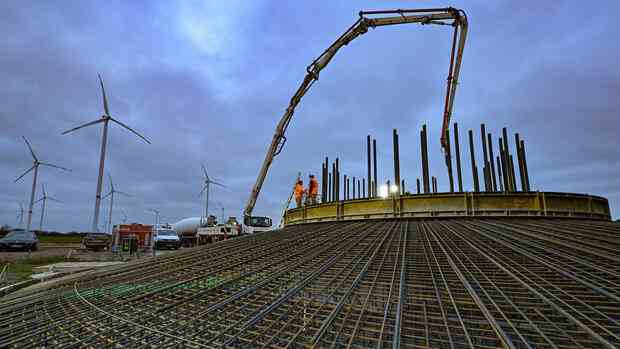RepowerEU aims to accelerate the expansion of renewable energies.
(Photo: dpa)
Brussels The RepowerEU project, with which the Europeans want to make themselves less dependent on Russian energy supplies, could soon suffer a major setback. Because the negotiations for financing are blocked. A round on Friday was canceled without result, as the Handelsblatt learned. RepowerEU is intended to promote the expansion of renewable energies, thermal insulation, energy efficiency and LNG infrastructure. 20 billion euros in fresh money are also to be used for this.
The EU Commission presented the plan in May. She wanted the money to be raised through additional CO2 emission certificates. In this way one would have gotten the money without any problems and at the same time would have reduced the costs for the industry, which is currently burdened by high energy prices. Because issuing new certificates lowers the price of CO2.
But to date, the member states are resisting this plan. The revenues from emissions trading benefit their households. That is why a lower CO2 price harms them.
Response to the American IRA
The EU states, represented by the Czech Council Presidency, remained adamant in the negotiations. They want to withdraw 15 of the 20 billion euros from the EU’s innovation fund.
Top jobs of the day
Find the best jobs now and
be notified by email.
The purpose of the innovation fund is similar to that of RepowerEU: it supports companies that invest in clean production methods. Should RepowerEU finance itself primarily from this, its additional benefit would be small.
>> Read here: With RepowerEU, the EU wants to solve its energy problem by 2030
That is why the EU Parliament rejects this proposal. MEPs don’t want to damage the Innovation Fund right now. “The innovation fund fulfills a task similar to the Inflation Reduction Act in the USA,” says Peter Liese (CDU), who is taking part in the negotiations for Parliament, the Handelsblatt. “For this we need more money in the future, not less.” With the Inflation Reduction Act (IRA), the USA is investing around 350 billion euros in climate protection and clean energy within 10 years.
As with almost all EU laws, the EU Parliament and the Council of Member States must find a common position for RepowerEU so that it can come into force.
>> Read here: Habeck’s answer – The Minister of Economic Affairs reacts to Biden’s billions in subsidies
On Friday, Parliament offered the Council to reallocate 2 billion euros from the innovation fund and then hoped for a concession. However, the member states showed no willingness to talk either on the question of financing or on other controversial points. The negotiators for parliament, Liese and the Romanian Siegfried Muresan, then left the negotiations. “The Council, especially the representatives of the finance ministries, did not recognize the seriousness of the situation,” said Liese afterwards. A spokeswoman for the Council Presidency declined to comment on the process.
Industry rejects Member States’ plans
Liese cannot understand why the member states are so fiercely defending their income from emissions trading: “The price per tonne of CO2 is much higher than planned,” he says. “The states are taking in billions that nobody expected.”
The energy-intensive economy tends to side with Parliament. Because they would benefit from lower carbon prices, while a shrinking innovation fund would make their investments more difficult.
“We are concerned that the Council’s proposal is in stark contrast to an industrial policy that makes the green transition a business case for our companies,” they write in one Letter to the Czech Presidency. The authors are 14 European umbrella organizations that represent sectors such as chemicals, cement, paper, ceramics, steel and fertilizer, in which a particularly large amount of energy is consumed.
>> Read here: The EU wants to use these funds to overcome the energy crisis
As a compromise, the associations propose issuing additional CO2 certificates that have so far been in a market stability reserve. This is what the EU Commission had proposed. Parliament’s plan is to issue more allowances now, but fewer in the coming years. So the total amount of CO2 emitted would remain the same.
Another point of contention in the negotiations is whether oil infrastructure can also be promoted with RepowerEU. Hungary, the Czech Republic and Slovakia still get most of their oil needs from Russia via pipeline. There is an exception to this in the oil embargo. The states want to use the RepowerEU funds to build alternative pipelines. Parliament rejects this in the interests of climate protection. On this point, too, there was no progress in the negotiations on Friday.
The final round of negotiations is actually scheduled for next Tuesday. There will be an unofficial meeting on Monday evening.
More: Interview with the Economics Minister: Are you jeopardizing the country’s energy supply, Mr. Habeck?
